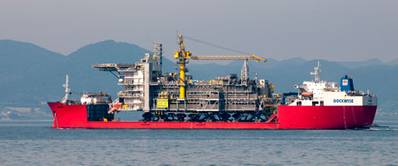Gas Prices Help Offset Statoil's Output Drop
Statoil's second quarter 2014 net operating income was NOK 32 billion, a decrease of NOK 2.3 billion compared to the second quarter of 2013. Adjusted earnings were NOK 32.3 billion.
“Statoil (STO) delivered solid operational performance in the quarter, with continued high production regularity on the Norwegian continental shelf and project execution according to plan. We have deferred gas production to enhance value, but remain on track for delivering on our production guiding for 2014.
"Our quarterly earnings were impacted by divestments, seasonal effects and lower gas prices. For the first half of the year, earnings were around the same level as in the same period last year," said Helge Lund, Statoil's president and CEO.
Statoil’s net income for the second quarter was NOK 12 billion, an increase from NOK 4.3 billion in the same period of 2013. Earnings per share were NOK 3.75, an increase from NOK 1.38.
Adjusted earnings were NOK 32.3 billion, a 15% decrease compared to the second quarter last year. The net adjustments of NOK 0.3 billion are primarily related to gains and impairments. In the second quarter, the company recorded a gain of NOK 3.6 billion from the farm-down in Shah Deniz and the South Caucasus Pipeline. The gain was offset by impairments of NOK 4.3 billion in the US onshore business, mainly related to sustained local price differentials. Adjusted earnings after tax were NOK 9.9 billion, compared to NOK 11.3 billion in the same period last year.
"Our cash flow from operations before tax is NOK 118 billion so far this year, and we have a strong balance sheet. We will pay a dividend of NOK 1.80 per share for the quarter, in line with our commitment to capital distribution to our shareholders,” Lund said.
Net debt to capital employed at the end of the quarter was 16%. Organic capital expenditure is $10 billion year-to-date, and the guidance of $20 billion for 2014-2016 remains unchanged.
Statoil’s adjusted earnings from upstream activities in Norway decreased from NOK 31.5 billion to NOK 24.1 billion. Earnings from upstream activities outside Norway increased to NOK 6.3 billion from NOK 5.9 billion, while earnings from the midstream increased to NOK 2.4 billion from NOK 0.8 billion.
In the quarter, Statoil made the high-impact Piri discovery in Tanzania. The discovery brings the total of gas in-place in Block 2 up to approximately 20 tcf, adding volumes for a future large-scale gas infrastructure development. Exploration expenses were NOK 2.7 billion, down NOK 1.4 billion compared to same quarter last year. The decreased expenses were mainly due to increased capitalisation as a result of successful wells.
“We continue progressing our programmes to reduce cost and improve capital efficiency. In the quarter, we have announced a potential to reduce between 1100 and 1400 positions. Reductions of around 1000 positions in our staffs and support services are already implemented. We have also established six specific high-impact projects addressing technical efficiency across the company, and we are now executing the first wave. We are on track, and will provide an updated status when we report our results for the full year,” says Lund.
Statoil delivered production of 1,799 mboe per day in the second quarter, down 9% compared to second quarter in 2013. Starting and ramping up of new fields such as Skarv in Norway, Marcellus and Eagle Ford in the United States together with PSVM and CLOV in Angola contributed positively to the production. This increase was partly offset by divestments and redetermination, expected natural decline, seasonal effects and optimisation of gas production.
Statoil continued its strong progress on project development and execution, including the award of a letter of intent for two steel jackets to the Johan Sverdrup field. This represents a new step forward in planning of the first phase of this important development on the Norwegian continental shelf.
The serious incident frequency (SIF) improved from 0.9 in the second quarter of 2013 to 0.7 in the second quarter of 2014.










